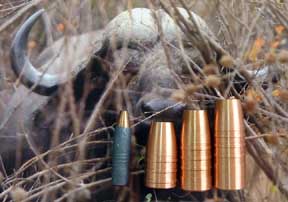

 The Accurate Reloading Forums
The Accurate Reloading Forums  THE ACCURATE RELOADING.COM FORUMS
THE ACCURATE RELOADING.COM FORUMS  Rifles
Rifles  Big Bores
Big Bores  Sectional Density
Sectional DensityGo  | New  | Find  | Notify  | Tools  | Reply  |  |
| one of us |
| |||
|
| One of Us |
Gerard Schultz/GS/Ghuru Supreme/Rasputin, I am not going anywhere. I have had my say, and I put it into perspective with the necessary qualification. There is a very important aspect here and that is that the depth of the hole in the bullet's tip should be of equal length in all bullets from 150 gr to 180 gr to 200 gr, and if that condition is not met, the whole comparison goes for a ball of shit, and that is why I did my test with the 7 mm bullets in 175 gr and cut each time 6 mm off of the base, to end up with progressively lighter bullets, so as to keep the tips and drilled holes at the same depth - that is very important. I do not differ with MacPherson's logic, but construction can overide the outcome. I say momentum is the driving force and not SD, but it is semantics and just another way of saying the same thing, because with the same velocity in all cases and differing weight, the momentum values will differ, and that is what is important (SD must be put into motion)- momentum is the force and not SD. I thought I explained it well, and I have posted a picture of my own testing confirming the outcome. And that is that. Good bye. Warrior | |||
|
| One of Us |
Well said!! Why go somewhere else to be confused by facts when one can be confused right here? Stick to your guns old chap, bent barrels and missing sights and all!! Bye bye, cheerio, fare thee well!! VVarrior | |||
|
| one of us |
| |||
|
| One of Us |
Rasputin replies ... "So, do you think that, as long as the hollow points are of equal volume and the nose shapes are identical, that expansion will be the same, regardless of bullet speed and weight? I suppose that is what happens when you base an opinion on a single test with a sample of three." What a stupid comment to make, are you halucinating !!! Who said regardless of speed? Are you out of your skull? This is why you deserve the name of Rasputin, as you always want to put another spin on things to deceive. Please concentrate buddy and read slowly again what I said, it may then dawn upon you. I have expressley stated that the kicker to outcome is because of the VELOCITY WINDOW. My test was not a sample of 3 but 9, 3 bullets at each weight. You are again jumping to conclusions, in a frail attempt to bolster your argument. They all look the same buddy. Did you think that they should vary in a haphazard fashion?. Or that they will be different if I had fired 12? There is logic to the Barnes-X method of drilling the hole only so deep. Consider a 2 mm hole vs a 5 mm hole vs a 10 mm hole. Will expansion differ? The same bullets, this time a side-view: 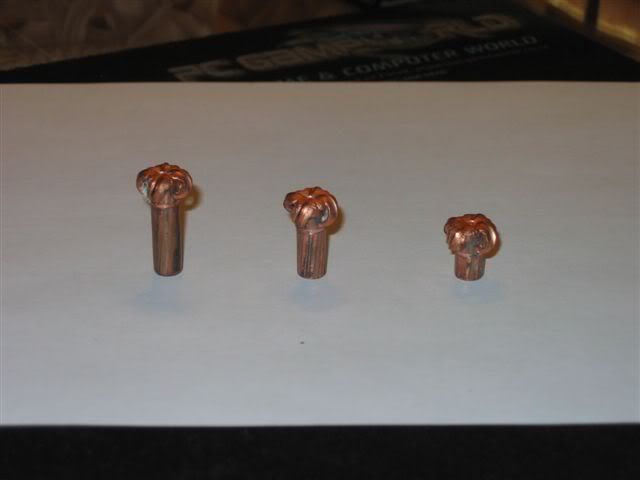 I say again, in that test of NF bullets that you refer to if the drilled holes were not of equal length in all bullets from 150 gr to 180 gr to 200 gr, (different length bullets for same caliber) and if this condition was not met, the whole comparison goes for a ball of shit !!! Warrior | |||
|
| One of Us |
I mentioned in a previous post that bullet design can play havoc with a bullet's performance. The local Claw bullet features a bonded core (pure lead) with pure 1-mm thick copper jackets. They are available in RN and Spitzer configuration. The Claw RN bullet is an example of when a particular design does not work as intended - i.e. to provide straight-line penetration, retain most of its weight, does not loose petals and open up without over-expanding, as that would impair penetration. 3 animals were shot with a 375 H&H, using the Claw 300 gr RN (round nose) bullet. Muzzle velocity was down loaded to 2,250 fps and the distance was about 60 paces for the Gemsbok and 25 paces for the warthog. Penetration was shallow because of over expansion and the 2 gemsbok had to take multiple shots each, except for the warthog. The first 3 bullets (from left to right) in the photo were shot and retrieved from the animals as indicated.Retrieved .375 Claw bullets. The 4 th bullet merely show a sectioned view of a .458/500 gr Claw RN bullet. The last bulletbeing a Barnes-X bullet retrieved from soil bullet stop wall at 100 yds. Animal ------- Mass retained ----- Expansion Gemsbok 1 ---- 151 (50%) --------- 2.6 x Gemsbok 2 ---- 227 (76%) --------- 3.2 x Warthog ------- 141 (47%) --------- 2.0 x It is clear that opening at the tip of the bullet is too small, and the curvature is such that the bullet flattens instead of opening up and this is aided by the inbuilt weakness of the cannelure as it folds there; with the result that it squeezes some lead out there as it separates and the folding takes place almost to be as flat as a penny . The same bullet in Semi-Spitzer form does not deform in this way. Thicken the walls up to 2-mm in the Spitzer and the right balance was achieved and its performance was absolutely magnificent. The lesson here is that expansion must be arrested at some point, as over-expansion inhibits deep penetration. Despite the Claw bullet's fairly good weight retention of 76%, its over-expansion to 3.2 times of original diameter, rendered it ineffective. Construction must be such that the bullet opens up in a controlled way; and progressively it must become stiffer to cater for higher impact velocities, and it must retain its petals. This is why construction and design is important - some bullets are prone to over-expansion and with some others the expansion gets arrested. 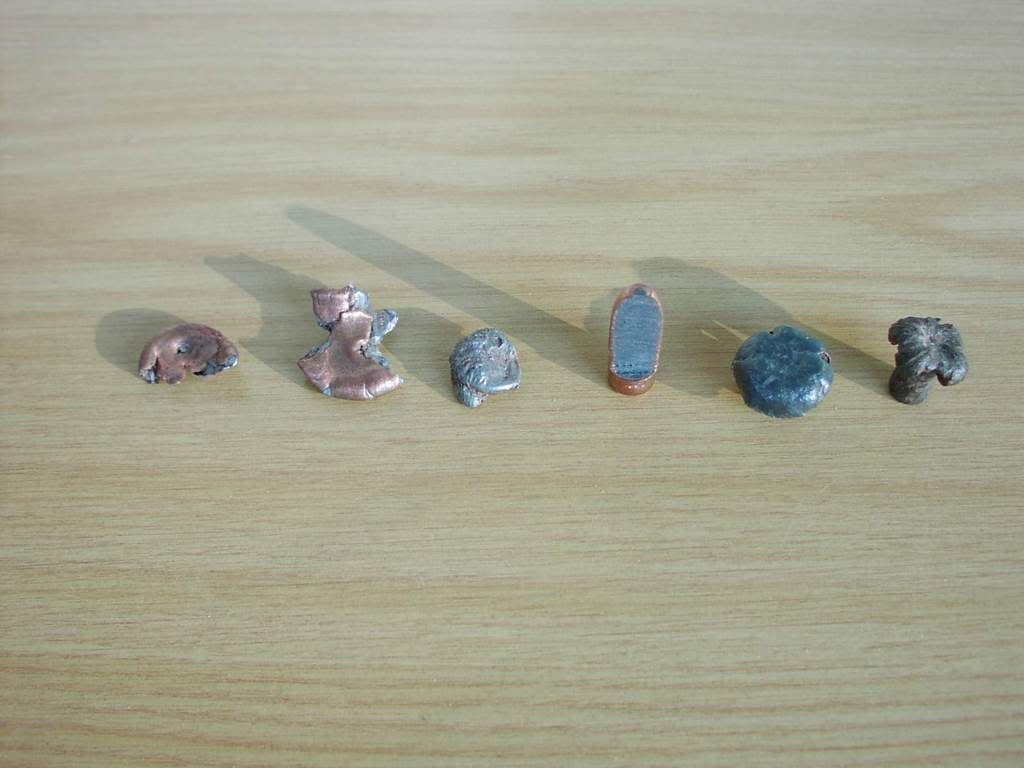 Warrior | |||
|
| One of Us |
The Swift A-Frame. 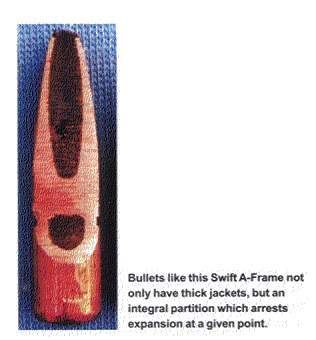 Warrior | |||
|
| One of Us |
What?! Are you back with more useful information and experience that you are repeating in the same thread for the gazillionth time. I thought that was that, good bye and so forth. Warrior posts:
I must say that your depth of knowledge and experience is quite amazing. Northfork bullets with holes drilled in them??!! Picture of Northfork bullet. Amazingly little depth, that is. I have to ask. You are not saying anything about the crows I have been asking you about? VVarrior | |||
|
| One of Us |
Bonded bullets like Rhino, Swift A-Frame and NF essentiall do have holes as well. They just get filled with lead and bonded. Their design is to arrest expansion at a particular point in time if you have not noticed that yet. Here is a better picture of .308 bullets in 165 gr, showing yet a further expansion due to progressively higher impact velocities. What is confirmed here is how ideal an impact velocity of 2100 fps is in terms bullet performance.  Warrior | |||
|
| One of Us |
You do like making issues out of non issues. Why ask if the holes are the same depth when you were told by Gerard they are? I guess you did not notice hey? Gerard posted on 4 December 2007
I found this interesting piece from Gerard on that page as well.
It looks like the moron mantle is starting to fit really well. Now about those crows........... VVarrior | |||
|
| One of Us |
I cannot take this at face value, as the apparent same "nose construction" does not necessarily mean that the holes are of equal depth. It stands to reason that bullets with different lengths do not have exactly the same measurements in terms of ogive length and drilled hole lengths from 150 grains up to 200 grains. It is certainly not the case with Rhino's that I have sectioned. Also jacket walls are often not the same thickness through out as we go to heavier bullets intented for bigger and tougher game. So I need to see sectioned bullets next to each other showing: - Same shape and length of ogive - Same rate of jacket walls getting thicker towards the base - Same length of drilled holes and same diameter It should essentially show that the shorter bullet is only shorter in its shank length. Also none of the above NF examples quoted are shot at the same velocity, and in many cases the construction is not equal, and hence most all operating windows are different so, it looks like a mixed bag to me. Gerard quoted me a velocity in all cases of 2500 fps. Typically with a strongly constructed bullet, like a Swift A-Frame, it would impact at about 200 fps lower at 100 yds at around 2300 fps bringinging them nicely into their ideal band of performance (velocity window). Just imagine the validity had Gerard picked the muzlle velocity at 2000 fps in all cases and the impact velocity around 1800 fps, or if you will, at 3000 fps, and they impact at 2800 fps - a totally different scenario, that would yield bullets not opening up properly, to partial to over-expansion and/or ripped off petals. Each bullet design has its own operation window. Why not repeat my test yourself with Barnes-X bullets, and cut them shorter from the base, like I did. Then you publish the photos for us - the one benefit will be that you can confirm my results, and the second would be to get you off your ass doing someting yourself rather than to regurgitate Gerard's comments to me as a praise-singer. Warrior | |||
|
| One of Us |
Gerard's praise singer. When a poster quotes someone else, he is a praise singer. The quotes below are from your posts on this thread!!
I did not know that you have the sole right to quote other posts and opinions. Crows? VVarrior | |||
|
| One of Us |
I went to the Northfork website and found descriptions that match those that Gerard gave in his examples. EG from the Northfork website
Unless you think that the guys at Northfork are telling tales, or that their construction uniformity is suspect, there is no need to section their bullets. They have an excellent reputation for quality and if they say the noses are the same, that is good enough for me. Curiouser and curiouser. I see that the compared examples Gerard quoted were indeed at the same speeds. I am beginning to suspect that you did not read the information presented. Am I right? VVarrior | |||
|
| one of us |
Warrior vs. VVarrior 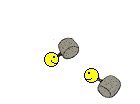 Tag-teaming Pontificus Erroneus to give Gerard a breather? | |||
|
| one of us |
Hi RIP, I sometimes wonder why so few members rag on Pontificus, it is so easy to do. I must say that sometimes he appears quite lucid, until one finds out where he Googled the lucidity from. He fools a lot of people like that. Pontificus Erroneus, go here to count the errors. | |||
|
One of Us |
It seems to me that rotational spin and bullet shape have a lot to do with penetration. IF a bullet is understabilized, it can dive off-course and lose penetration power. Also a lot depends on what the bullet hits during penetration - bone, gistle, muscle, etc. "Bitte, trinks du nicht das Wasser. Dahin haben die Kuhen gesheissen." | |||
|
| One of Us |
I have a number of bullets of the same SD of about .271 400 gr .475 Barnes bullets. IF the SD is so important to people than there needs to be a beter way to figure how they expand and the effect on the SD. The TSX will travel about 24" at 50-75 yrd shots and the solid will travel 60"+ as I only found one as the other exited the other end of a Asiatic buffalo. Both have the same SD and overall length and nose shape, but perform different. SO how do we factor the expansion retio into the SD figure? I tend to use more than enough gun. | |||
|
| one of us |
Doug, You should not compare apples (solids) to oranges (softs). Consider 1. GSC .510"/570-grain FN solid. 2. Barnes .509"/570-grain XLC soft, the old smurf bullet, which is a better bullet than the newer .508"/570-grain TSX soft. Both are fired at 2400 fps from a 1:10" twist. The XLC soft will not exit on a broadside shot into the chest of a large bison bull, about 2 feet of penetration, in mostly lung, with no more bone than a rib struck, on repeated testing alive and dead, two shots, same result each time. The GSC FN will exit on a Texas heart shot, about 8 feet of penetration, in at the rump, out at the neck near the head, on repeated testing alive and dead, two shots, same result each time. The SD was .510/570-gr FN solid: 0.3130663 .509/570-gr XLC soft: 0.3142977 You see that the FN solid apple works much better than a soft orange, where penetration is concerned, even with the soft having greater than .001 SD advantage. The XLC opens up like a parachute and retained all petals. That has a drag chute effect. The GSC FNs plowed on through and are still orbiting the bison pasture. Apples and oranges. | |||
|
| One of Us |
Doug, This reference comes from Gerard out of Macpherson's book (P142) and I have stated previously that I do not say MacPherson is wrong, we just need to make sure that we interpret him correctly as to what he really meant, as sometimes we all write things and we meant something, but someone will come along and misinterpret what was meant. Then Gerard comes along and quote me Macpherson, as I do not have his book" "From Bullet Penetration page 142: "An increase in bullet sectional density will cause equivalent expansion at lower velocity. Greater expansion occurs at the same velocity because the decelerating forces must act for a larger time interval to reduce the bullet velocity. The decelerating force and the stagnation pressure causing deformation are highly correlated." And then Gerard goes on to say .... "This is all in one paragraph. What is there to interpret? It is as clear as daylight." SD on its own is NOT a "decelerating force". And now we can clearly see what Macpherson really meant ... meaning the bullet in motion (that has velocity) that exhibits momentum and energy. But I have written to Gerard before in a previous post before his above comment was made, and I quote .... "Regarding the question that SD drives expansion, I have stated the following before and I quote: .... "I do not say MacPherson is wrong, we need to make sure that we interpret him correctly and not out of context, as you have done before when Alf pointed that out to you. My submission was that bullet construction can limit expansion by design - for example, and I will give a very simple explanation ... If we drill a hole of 2 mm, or 3 mm, or 4 mm, ....... all the way up to 10 mm a Barnes-X bullet , we will have very different expansion, as it rolls up to maximum within its velocity window. If we do not drill a hole in it, it remains a solid and do not mushroom. It is done by the force or momentum behind the tip of the bullet and not because of SD per se - SD is not a force, it is a ratio without motion. Only when velocity is applied will we get momentum and deformation will go up as we apply more velocity that drives momentum values up." So, SD only comes alive once it is put into motion, and then we have momentum. It is therefore more correct to say that it is the momentum of the bullet. SD is intrinsically involved by way of different bullet weights in the same caliber. It stands to reason that a higher momentum equates to a higher force. M --------------- V ---------- Mo ------ Mo Index 150 gr --- 2,500 fps --- 53.57 ------- 100 180 gr --- 2,500 fps --- 64.29 ------- 120 200 gr --- 2,500 fps --- 71.43 ------- 133 And that is also why the ratio of Mo/Xsa is a superior measure over just SD when we judge penetration ability. That is force applied over frontal area, and if three different bullet weights are shot, like using Barnes-X bullets at modest muzzle velocity of say 2500 fps, and the expansion is double its original diameter in all cases, then we find that the higher momentum bullet penetrates the deepest. Gerard and I have actually agreed many postings before that momentum is the driver, and not SD, but now in this case he switches back to SD, just because it suits him to differ in and endless cycle of futility, and that is why I am not responding to all mis quotings and personal insults. First he was not happy that I apparently shot 3 bullets, and when I stated that I shot 9 bullets (3 at each weight), now he is not happy with that. I could have continued to finish a box of 50 and the results would have been the same - and for that matter, I could have carried on (perhaps in disbelieve to what I am seeing) and shot a 1,000 rounds, all yielding the same results. Then come back and post, and find that Gerard still rejects the validity of the result. That's how it is ... a waste of time to have any discourse with him !!! As an overide, I stated that there is a velocity window that we have to recognise, as we are not dealing with a linear realtionship. Imagine shooting different bullet weights (like we have above) at say 1,500 fps and at say 3,500 fps. We will see bullets that do not open up at all (at low velocity) to bullets with ripped off petals (at high velocity) if they were Barnes-X bullets, or unrecognisable blobs of metal if they were conventional lead-core bullets. Being outside a bullet's ideal operating window and the bullet will not perform as intended. Warrior | |||
|
| one of us |
| |||
|
| One of Us |
Warrior How do you figure what the SD would be of the same bullet weight and velocity 2100 FPS but after shot one expands from .475 to .900 and is shortened from 1.125 to .850 ? I tend to use more than enough gun. | |||
|
| One of Us |
Hi Doug, I take it that you know the formula to calcualte the SD of a bullet (weight/diameter squared). The way I read your question is that you want to know the "terminal" Sd and not the "pristine" SD of the bullet in its unfired format. The expansion that you site in your example is an expansion of 1.9 times (.900/.475) of original diameter. It is far easier to focus and interpret the expansion ratio (in this case 1.9x), than the terminal SD expressed in minute decimals. What is important for me is the reason why bullet makers design bullets that expand, and more specifically the new generation of bullets that expand in a controlled way. That means that the expansion should be arrested at some point so it does not over expand, and thereby inhibit adequate penetration, and at the same time to create a bigger wound channel than what a non-expanding bullet would do. The difference between the pristine SD (higher value) and its terminal SD (much lower value) is testimony that the bullet has done its work, as per its designed criteria. As the petals open up and curl backwards, the bullet is bound to get shorter. In your example the bullet shrunk by 24.5%. Trusting that I have answered your question. Warrior | |||
|
| One of Us |
Yes that is right, It seems that all the African PH's are set on this .300 SD but I can not get any to take into the fact that bullets mushroom and deform. So also the SD facts that the bullet manufactures give is really a bogus number that is not really a true one that has been shot at X velocity or variable number, but only as a static/pristine number. Should the bullet MFG's set the SD for a non solid as the SD for the bullet shot at X velocity to be the true given SD? So how can people get so uptight about the SD number if it has so many variable unless they are talking about a solid that will not change in the OAL after it has been subjected to terminal velocity? I tend to use more than enough gun. | |||
|
| one of us |
Too much emphasis on SD! SD, which is an artificially-defined-square-bullet analogy. SD has imaginary units, but is proportional to reality, blah, blah, blah ... Sponge Bob Square Pants ... blah, blah, blah ... Doug, you need to get back to a "Schultzian" view of the universe, where the square-bullet-analog "initial SD" is just not spoken of. SD is avoided mention whenever possible. Also to be avoided, is any "terminal SD" (based on actual cross-sectional area and leftover weight after expansion). Rather just work up the proper equations in terms of bullet mass, velocity and caliber, and don't forget the all important "toughness" factors for any softpoint-expanding bullet. The .475 Turnbull is better than a 45-70. If one must handicap himself with a lever action rifle, one could certainly do worse than a .475 Turnbull. If you cannot equal a .475-cal/500-grain/2150 fps for a 470 NE equivalent, with soft and solid, then you can at least give it a superior TWIST, make it twice as fast as the 470 NE antique! That will give you an edge! Make it 1:10" TWIST like my excellent 470 Capstick! You gotta dance with the one you brung! DO THE TWIST! Chubby Checker | |||
|
| One of Us |
Sponge Bob Density Equation | |||
|
| one of us |
SD = Squarepants Density BTW, on Tracks Across Africa TV, I watched Craig Boddington kill that Mozambique cape buffalo with the .475 Turnbull lever action. I had it on TIVO and swore I saw the bullets in transit to the buffalo ... another case where the sun was just right to shine off the bullet base. Craig kept firing until either the buffalo was out of range or he ran out of .475 Tubular! First shot looked like a good lung shot, I saw the bullet in flight and impact. Second shot looked like a gut shot. I saw the bullet in flight and impact. I played it in slow-mo and sure enough, there go the bullets visible in flight and impact. Was that seven or eight shots? I think I saw 6 of the bullets flying, not all hitting the buff. Did the PH fire some of those shots? How many shots of .475 Turnbull does that tubular magazine hold? 1886 Winchester? | |||
|
| One of Us |
26" full magazine, 8 + 1 about a pound of shooting enjoyment. Shoot slower and put the shot where it is does the most damage. Speed in the second or third or seventh shot is not always the best but shot placement does the most damage! Oh, by the way I found that Mobil 1 synthetic oil use in all my guns to keep them smooth running and does not foul my primers. I tend to use more than enough gun. | |||
|
| one of us |
"Experience" is the only class you take where the exam comes before the lesson. | |||
|
| One of Us |
Et Tu, Brute? I having a renewed love affair with the levers, .405, .50 Alaskan---and now --maybe the .475 Turnbull. Haven't tossed all my bolts but the levers are multiplying. DuggaBoye-O NRA-Life Whittington-Life TSRA-Life DRSS DSC HSC SCI | |||
|
| One of Us |
DuggaBoye I had the same multiplying problem with my Levers about 6 or 7 years ago until I neutered them... Last night I loaded up a 245 gr. 8mm FN cast boolit for cycle testing in a like new pre-64 94 in a .32 Winchester Special that on it's way here... There should be a bit of SD with that boolit I would think..eh? | |||
|
| Powered by Social Strata | Page 1 2 3 4 5 |
| Please Wait. Your request is being processed... |
|

Visit our on-line store for AR Memorabilia

